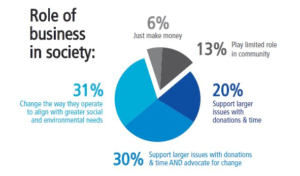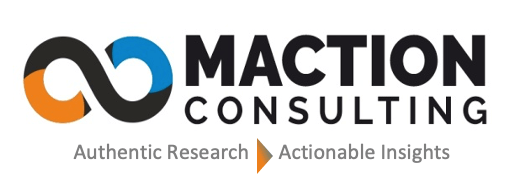“Businesses cannot be successful when the society around them fails.”
If you are a businessman whose sole objective is to make profits and make zero contribution towards your social image which triggers untenable – but this is an old game now.
Be it championing women’s rights, working for the environment, or attempting to eradicate poverty from a larger section of the society, CSR – Corporate Social Responsibilities are now looking beyond the walls of company profits and stepping into the world to aid the world as a community.
As the quote in the beginning rightly says, a business cannot be successful if the society around then fails. We couldn’t agree more with them. Businesses that approach a welfare-oriented development by delivering three pillars/principles; the economy (Profits), society (People), and the environment (Planet) creates a positive image which in turn sustainability.
A CSR policy improves company profitability and value. It is important that the introduction of energy efficiencies and waste recycling cuts operational costs and benefits the environment. Further, it increases company accountability and transparency with investment analysts and the media, shareholders, and local communities. Hence it paves the way to branding and sustainable business. Thus, CSR is considered an essential element for a successful business.
Being socially responsible makes a company strengthen its image and build its brand stronger than ever. Indulging in such activities helps the company connect to society at a very intimate level, in turn, benefiting them in every manner possible. If we talk about recent years, CSR has become the talk of the corporate town.
As per a report published in Forbes Magazine, 42% of what people assume and feel about a company depends upon their CSR activities. This indicates that almost half of the company’s image is determined by how people feel about them through their CSR activities. This makes it now more than ever one of the most important aspects to focus and invest in.
Why Is CSR Research Important?

Today, CSR has become mandatory by the big corporates. Furthermore, a bill has been passed which dictates that 2% of the profits have to be used towards CSR activities. A CSR study by Cone Communications Global learned that 91% of people expect to address economic, social, and environmental issues responsibly.
Let’s take an example of the Gorkha earthquake in Nepal, 2015. Post the quake, Ncell – which is Nepal’s largest service provider shared its mobile data with a Swedish non-profit organization involved in a local humanitarian aid at that particular time. This helped the government to trace population movement and other important aspects that helped control the casualties to a great extent.
What happened next?
This act helped Ncell to establish a stronger ground in Nepal and strengthened all sectors of their business. This makes CSR research a very important factor for your business and operates sustainably.
Here’s why a business should be diving more into CSR Research –
- Helps in engaging customers and clients
- Helps improve brand perception
- Improves innovation and collaboration inside the business
How To Perform CSR Research?
It’s not just about “looking good’ but it’s more about “doing good”. Modern vendors want to do business with companies that do good and in fact, they also have the tools to find out if companies are taking CSR seriously right from their supply chain sourcing practices to their internal pay equity standards.
Maction is known for providing CSR research support services that help companies make better and informed decisions for their CSR strategies.
Now, we know that CSR is a great conduit both for your company and the community around, here’s how you take your first steps to launch and measure your first CSR campaign.
A. Need Assessment Study: The first step, to begin with, is a need assessment study. You need to identify the area where there is maximum need so that your fund can create maximum impact. Let’s say you decide to fund a village in the city of Maharashtra. What are the developmental areas you look at? Before need assessment, it is important to understand who (companies) are all implementing CSR in this geography, which will enable us to avoid duplication and gives us room to think differently. This will be secondary research or desk work kind of task.
You can invest in education, healthcare, sanitization, hygiene, livelihood, or modern agricultural practices. You need to understand what is the maximum need of the situation which will bring in maximum impact. So, if you decide to invest in a village where the literacy rate is very less, investing in the educational sector will be impactful. Or if you see that schools are not in proper conditions and students are not being benefitted, you can help by providing scholarships, mid-day meals, books and even building the school infrastructure. It’s that simple. The entire point is, to meet the need for maximum impact.
B. Baseline Study of Selected Areas: Once you have identified the areas, you need to set up a baseline study for the same. This study helps you analyze the current situation so that you can identify the starting points of the project. This study looks at all those data points which are needed to establish a baseline or a starting point.
So, let’s say you decide on a healthcare area in a village. Now, when you start from a baseline level, you need to get a complete picture of the healthcare system in the area and be specific to it. How many hospitals are there in the area? Are there enough doctors to support the disease patients? What is the mortality rate due to the lack of healthcare systems in place? Is there a healthcare infrastructure problem or is there a lack of resources? Are kids and elderly people having access to healthcare? What about pregnant women and infants? How much capital should I invest in the area and what will bring out maximum benefits?
It is very important to design the Baseline study meticulously to enable us to compare and measure the impact CSR made on the ground. It is a fact that the outcomes don’t show immediately. It takes its own time for any outcome to show and changes to reflect. Hence, doing a baseline study allows you to compare metrics and give you the exact result based on your funding and its response to it.
A midline assessment should be conducted for course correction which allows the company to change and restrategize its action plans to bring in higher impact. An endline assessment is recommended which acts as a baseline for future projects
C. Impact Assessment & Study: Impact assessment helps your company to understand and evaluate its social investments. The findings help you to make evidence-based decisions that allow the program to continuity, scale, or re-strategize in its actions. As per rule 8 (3)(a), the Impact Assessment study will be undertaken by the Independent Agency. Hence, it would be important to hire an independent agency like Maction for availing one-point solution to undertake the vital Impact Assessment study.
An impact assessment study helps in showing accountability to the funding organization. For instance, let’s consider that a local NGO needs to show the impact assessment study to the World Bank who funded the project, and hence a study is always valuable to determine the results of the same.
Challenges
It is very difficult to see the impact of welfare/ CSR as many factors take time to show the result. Let’s say you created a school in a village. Factors like educational adoption and literacy rate will take time to reflect. The behavioral patterns of people might cause an impact on the theoretical plan to reflect. Knowledge, attitude, behavior, and actual practices have a great impact on the result.
So, how do you measure the impact? Let’s consider this through an example. One can compare the Key Performance Indicators among an intervention village with the village that does not have intervention (as the control group). Thus, the impact can be attributed to CSR campaigning.
Case Study: Coca Cola’s CSR Campaign

Coca-Cola – the sweet carbonated drink has always been in the limelight for its CSR activities. Coca-Cola focused on harnessing the power of social responsibility towards women through its CSR activities – which is one of the most powerful and impactful initiatives that a company can take.
Women are key to success and in 2010, Coca-Cola stood by their words through their 5by20 CSR campaign. Since then, they have set a goal to empower 5 million women by the year 2020. They have worked with countless partners to empower and provide women with skills like – business skills training, mentoring financial services, and other such assets which helped women improve their livelihood and increase their entrepreneurial spirit.

Source: Coca Cola
This is exactly why they named their campaign 5by20 – which signifies empowering 5 million women by the year 2020. Isn’t that great and creative? However, they were more than successful not only in achieving desired numbers but also in empowering more than 6 million women across 100 countries across the globe.
The chairman and CEO, James Quincey says,” By investing in women’s economic empowerment over the past decade, we have created shared value in hopes of a better-shared future—enabling improved livelihoods for women, their families, and their communities.”
They could achieve these targets only because they had a scalable model and powerful partnerships. As for the future, the company remains committed to bringing a change in society and continues to empower millions of women around the world.
Here are the takeaways from Coca Cola’s CSR Campaign –
- Harnessing the power of technology helped them rapidly and flexibly scale their training programs by giving women access to digital programs during the pandemic from their homes.
- Started the CSR Campaign in Africa before scaling to other geographical locations. Batched out their CSR expansion plan in phases.
- The CSR Campaign shared a value-based model both measurable in terms of societal and commercial impact.
- Partners with multiple global partners like UN Women, the Bill & Melinda Gates Foundation, Technoserve, and CARE on regional and country-based levels to kick off the expansion successfully.
The Bottomline
Achieving long-term financial success is the key goal of any business in action. CSR is yet another way to get to your goal faster, better, morally correct, and more importantly sustainable. This is why it is very important to get your research right.
Good CSR research will lead to an impactful campaign, in turn resulting in greater benefits for your company. Not just shortly but for years to come. Be socially responsible and give your business and its supporting environment the nourishment and support it needs in the form of CSR.
CSR would be a platform to facilitate pragmatic contributions that have the potential to inform academic discourse and managerial practice on the transformative role of business in society.


